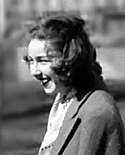Flannery O'Connor Quote
I never argue, Jacobs said. That’s because you don’t know this kind of ignorance, Rayber explained. You’ve never experienced it. Jacobs snorted. Oh yes I have, he said. What happened? I never argue. But you know you’re right, Rayber persisted. I never argue. Well, I’m going to argue, Rayber said. I’m going to say the right thing as fast as they can say the wrong. It’ll be a question of speed. Understand, he went on, this is no mission of conversion; I’m defending myself. I understand that, Jacobs said. I hope you’re able to do it. I’ve already done it! You read the paper. There it is. Rayber wondered if Jacobs were dense or preoccupied. Okay, then leave it there. Don’t spoil your complexion arguing with barbers.
Flannery O'Connor
I never argue, Jacobs said. That’s because you don’t know this kind of ignorance, Rayber explained. You’ve never experienced it. Jacobs snorted. Oh yes I have, he said. What happened? I never argue. But you know you’re right, Rayber persisted. I never argue. Well, I’m going to argue, Rayber said. I’m going to say the right thing as fast as they can say the wrong. It’ll be a question of speed. Understand, he went on, this is no mission of conversion; I’m defending myself. I understand that, Jacobs said. I hope you’re able to do it. I’ve already done it! You read the paper. There it is. Rayber wondered if Jacobs were dense or preoccupied. Okay, then leave it there. Don’t spoil your complexion arguing with barbers.
Related Quotes
About Flannery O'Connor
Mary Flannery O'Connor (March 25, 1925 – August 3, 1964) was an American novelist, short story writer and essayist. She wrote two novels and 31 short stories, as well as a number of reviews and commentaries.
She was a Southern writer who often wrote in a sardonic Southern Gothic style and relied heavily on regional settings and grotesque characters, often in violent situations. An unsentimental acceptance or rejection of the limitations, imperfections or differences of these characters (whether attributed to disability, race, crime, religion or sanity) typically underpins the drama.
Her writing reflects her Roman Catholic faith and frequently examines questions of Catholicism-defined morality and ethics. Her posthumously compiled Complete Stories won the 1972 U.S. National Book Award for Fiction and has been the subject of enduring praise.
She was a Southern writer who often wrote in a sardonic Southern Gothic style and relied heavily on regional settings and grotesque characters, often in violent situations. An unsentimental acceptance or rejection of the limitations, imperfections or differences of these characters (whether attributed to disability, race, crime, religion or sanity) typically underpins the drama.
Her writing reflects her Roman Catholic faith and frequently examines questions of Catholicism-defined morality and ethics. Her posthumously compiled Complete Stories won the 1972 U.S. National Book Award for Fiction and has been the subject of enduring praise.
